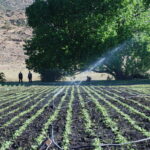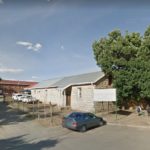Lesotho Agricultural College
DESCRIPTION OF THE DEPARTMENT
Lesotho Agricultural College (LAC) is one of the seven (7) technical departments (Program 6) of the Ministry of Agriculture and Food Security (MAFS). Since its establishment in 1954 as Maseru Agricultural School (MAS) and today Lesotho Agricultural College (LAC), with the major objective of producing young Basotho Men and women, well trained in various fields of agriculture at Certificate and Diploma levels to be field extension agents for the Ministry of Agriculture, it has been characterized by a series of mertamophological processes. LAC has expanded from offering one (1) academic program – a two (2) year Certificate in Agriculture (CIA) in 1955, to offering seven (7) academic programs to date, namely two (2) years Certificate in Home Economics (CHE) and Certificate in Agricultural Mechanization (CIAM); and three (3) years Diploma in Agriculture (DIA), Diploma in Forestry and Natural Resource Management (DFRM), Diploma in Home Economics (DHE), Diploma in Home Economics Education (DHEE) and Diploma in Agricultural Engineering, Land and Water Management (DAELWM), the latter two being run from Leribe Campus.
In 1978 LAC established another campus at Hlotse in the Leribe district, and in 1979, LAC attained an affiliation status from the National University of Lesotho (NUL), for purposes of accreditation of its academic programs. In 1986, academic programs were also expanded to include production of graduates well trained in entrepreneurial and teaching skills in order to enhance commercial farming efficiency and global market-targeting confidence, and teaching capacity at Secondary/High Schools, through the Student Enterprises Projects (SEP) program and Education option in the third year of Diploma in Agriculture and Diploma in Home Economics programs.
Introduction of the Student Enterprise Projects (SEP) program in 1986 was a significant milestone in the provision of entrepreneurial skills required to enhance commercial farming efficiency and global market-targeting confidence. This was over and above the decision to establish the Leribe Campus, which was designed to produce practical-oriented personnel to deliver extension services under the auspices of the agricultural sector.
With the ever changing environment and increasing challenges against and/or in which Lesotho’s agriculture is operating and/or faced with, it is mandatory that LAC must accordingly change, in order to meet the challenges which agriculture in Lesotho faces. Invariably, expansions in the number of campuses and academic programs, is not only to increase student enrolment numbers to service the extension delivery of the agricultural sector, but most importantly, to enhance production of well-trained practical oriented personnel; agricultural teaching confident personnel and commercial farming oriented efficient and confident producers, the latter who can take comparative advantage that Lesotho has in the global market arena, by engaging in production of high value products and agro-processing for value addition.
OUR MISSION
LAC is committed to providing professional education and training, promoting research and community outreach, and providing guidance on commercialized agriculture, through combining quality theory, practical and research methodologies.
OUR VISION
By 2030, LAC shall be a centre of excellence, guided by appropriate research, renowned for competent graduates, and responsive to clientele needs. These are the pillars of our development agenda.
OUR SLOGAN
“ Pro Patria Labor emus!”, translated to mean “Let us work for our fatherland”.
THE KEY OBJECTIVES
a) To increase capacity of the ministry for improved service delivery .
b) To increase commercialization and diversification of agricultural production.
c) To improve the quality of education, training, research and consultancy.
THE KEY ACTIVITIES
The role of LAC as an entity within the Ministry of Agriculture and Food Security is mainly:
a) Training young Basotho men and women in various fields of agriculture at Diploma level to be effective and efficient extension personnel, agricultural teachers at secondary and high school levels, to be competitive commercial farmers and to enhance increased agricultural productivity in Lesotho.
b) Advising the Ministry of Agriculture and Food Security (MAFS) and Ministry of Education (MoET), on the formulation of agricultural production and education policies, respectively
c) Providing consultancy services and specialized short term training courses to local and/or regional institutions.
d) Conducting applied research in collaboration with local and/or international research organizations.
e) Operating a farm for the purposes of teaching students practicals, and to market surpluses for revenue/income generation. LAC as an academic institution, ensures high quality agricultural education and training and assure its compliance with the minimum requirements as enacted by the Higher Education Act (2004). LAC shall have to engage on strategic actions geared towards improving access to agricultural education and training.
LAC allows itself to grow to enable award of diplomas, degrees and post-graduate degrees in Agriculture, Home Economics, Forestry and Natural Resources and Agricultural Engineering and other fields that the curriculum would allow.
The functions of LAC are therefore:-
i. To provide education and training to members of the agricultural cadre and profession and to such other persons as might be determined by the Governing Council.
ii. To provide programmes, courses of study or instruction in the fields that the Council may from time to time deem appropriate.
iii. To confer, grant or give or recommend conferment, granting or giving diplomas, or other established awards with respect to agricultural entrepreneurship and education and training programmes, through the links and affiliations with other institutions of higher learning.
iv. To provide facilities for, and undertake research and development;
v. To disseminate information and knowledge and promote scholarship.
vi. To foster relationships by way of affiliation, association or link with other institutions and agencies.
vii. To enter into arrangements with other relevant institutions for the purpose of offering joint courses and of conducting research and development work, and of exchange programmes for staff and students.
viii. To exploit results of research and development work undertaken by the College either separately or jointly, including entering into arrangements with other bodies or persons and participation in limited liability companies.




























